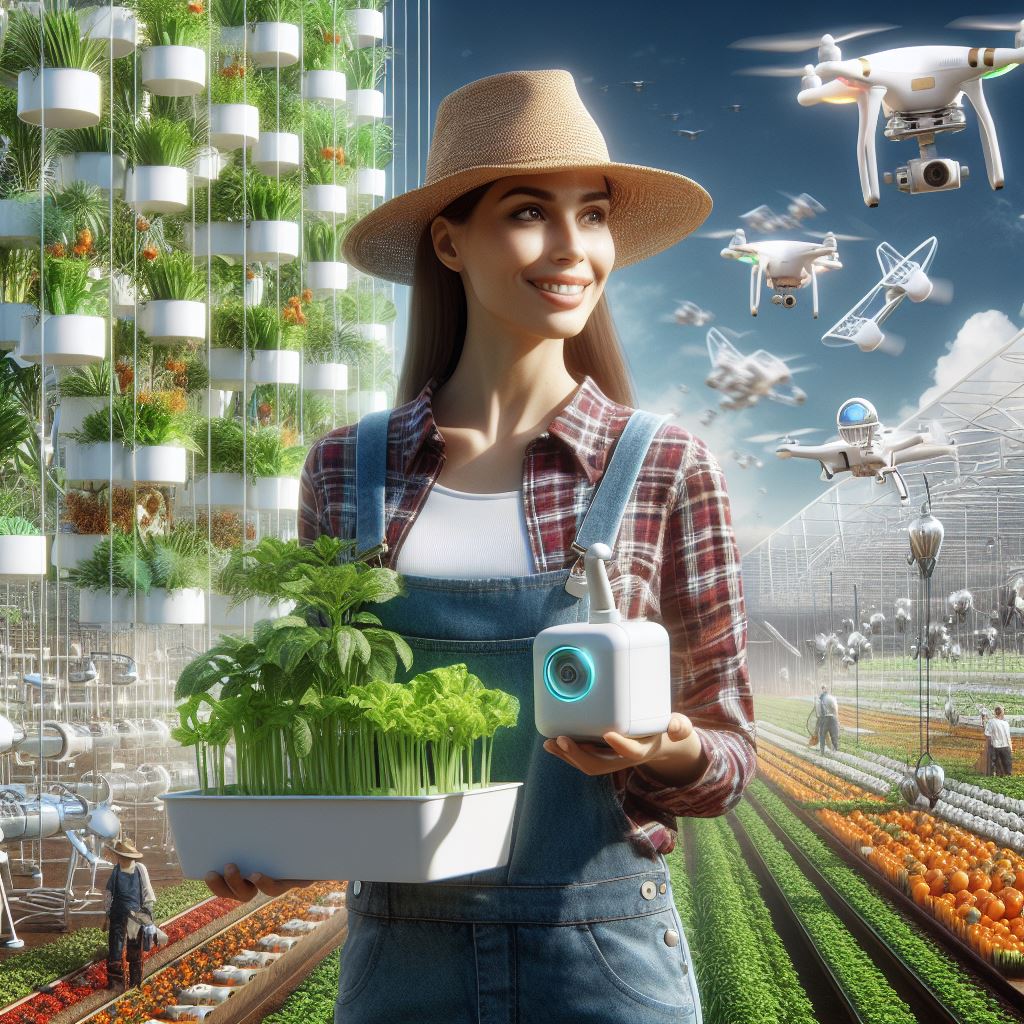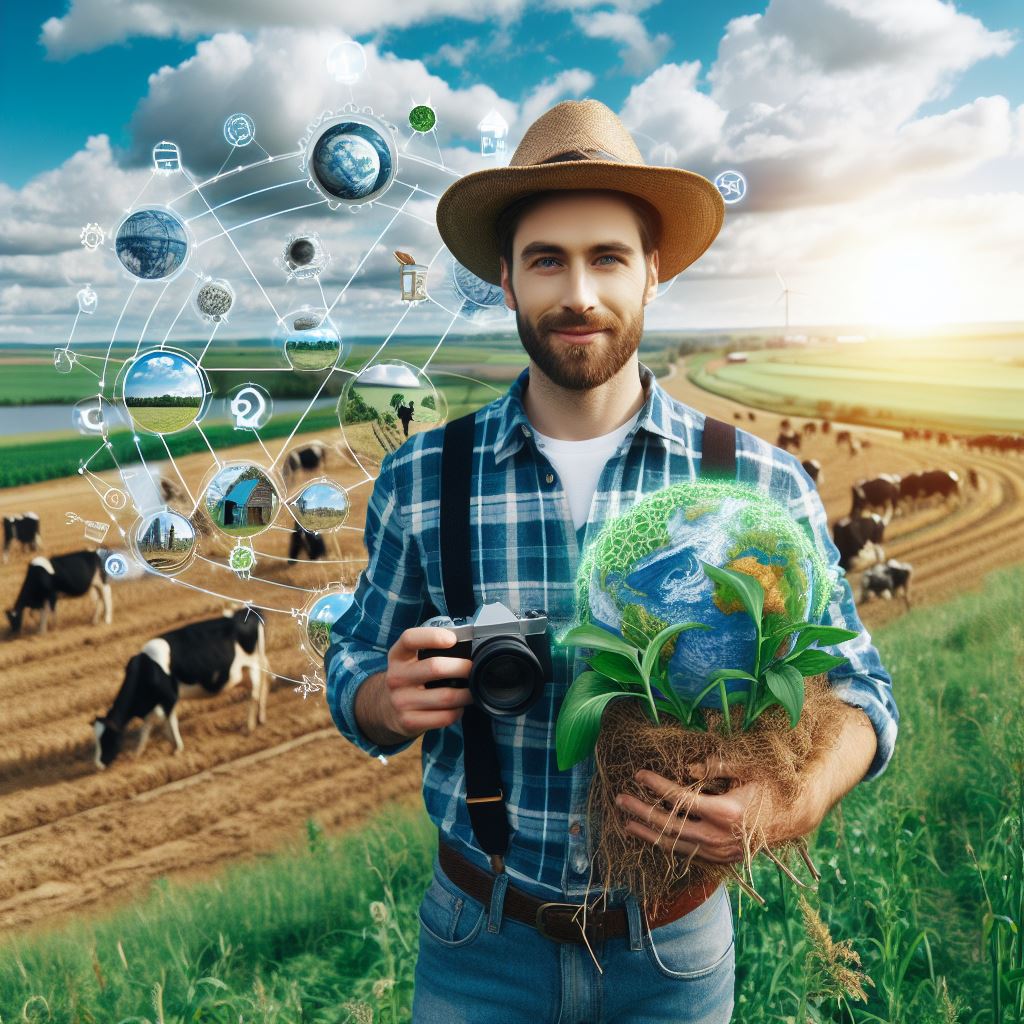Introduction
In today’s blog post, we will be discussing the importance of future policies in farming and exploring the current state of the industry.
Importance of discussing future policies in farming
Discussing future policies in farming is essential for sustainable development. It enables stakeholders to address emerging challenges, such as climate change and
food security, while promoting innovation and equity.
Through collaboration and dialogue, we can shape policies that support resilient and environmentally responsible agricultural practices.
Brief overview of the current state of farming
The current state of farming is characterized by a blend of challenges and opportunities.
Farmers grapple with climate change impacts, resource constraints, and market volatility, while also embracing technological advancements and sustainable practices.
Issues like food insecurity, soil degradation, and rural livelihoods persist alongside efforts towards resilience and innovation.
As stakeholders navigate this complex landscape, collaboration, investment in research, and policy reform emerge as key pillars in shaping a more sustainable and prosperous future for agriculture.
Ultimately, our focus will be on the main topic: The Future of Farming: 2024 Policies.
Key Challenges in the Current Farming System
Climate change and its impact on agriculture
One of the key challenges faced by the current farming system is the increasing impact of climate change.
Rising temperatures, erratic rainfall patterns, and extreme weather events have all resulted in decreased crop yields and increased pests and diseases.
These changes make it harder for farmers to predict and plan for their harvests, leading to financial losses and food insecurity.
Furthermore, climate change also affects the quality of soil and water resources – both essential for successful farming.
Without proactive measures, such as implementing climate-smart agricultural practices, farmers will continue to face these challenges.
Depletion of natural resources and its effect on farming
In addition to climate change, the depletion of natural resources is another significant challenge in the current farming system.
Transform Your Agribusiness
Unlock your farm's potential with expert advice tailored to your needs. Get actionable steps that drive real results.
Get StartedThe excessive use of water for irrigation has led to the depletion of aquifers and water scarcity in many regions.
Deforestation, primarily for expanding agricultural land, has also contributed to the loss of biodiversity and disrupted delicate ecosystems.
Moreover, the overuse of chemical fertilizers and pesticides has polluted both soil and water, posing threats to human health and the environment.
To address this challenge, sustainable agricultural practices such as conservation farming and organic farming need to be adopted.
The need for sustainable and efficient farming practices
Given the challenges of climate change and resource depletion, there is a pressing need to transition towards sustainable and efficient farming practices.
Sustainable farming practices aim to minimize negative environmental impacts while maintaining or increasing productivity.
For example, precision farming techniques, such as using sensors and data analytics, can optimize resource usage and reduce waste.
Similarly, agroforestry and crop rotation techniques help improve soil fertility and prevent pest outbreaks.
Furthermore, investing in agricultural research and innovation can promote the development of climate-resilient crops and farming methods.
By adopting these practices, farmers can mitigate the challenges they currently face and create a more sustainable future for agriculture.
In essence, the current farming system faces several key challenges.
Climate change poses a significant threat to crop yields and resources like soil and water.
The depletion of natural resources, such as water and biodiversity, further exacerbates the challenges faced by farmers.
However, by embracing sustainable and efficient farming practices, we can mitigate these challenges and ensure a more resilient future for agriculture.
Read: 2024: Changes in Farming Subsidies
The Role of Policy in Shaping the Future of Farming
Government policies play a crucial role in shaping the future of farming.
These policies not only provide guidelines but also create an enabling environment for agricultural development.
By implementing relevant and effective policies, governments can drive sustainable and efficient farming practices that ensure food security, economic growth, and environmental sustainability.
Here, we will explore the importance of government policies in agriculture, provide an overview of the current policies related to farming, and discuss the necessity of reviewing and updating policies to address future challenges.
Importance of Government Policies in Agriculture
- Government policies provide a framework that farmers and agricultural stakeholders can rely on.
- These policies offer stability, predictability, and a sense of direction for the agricultural sector.
- They help farmers make informed decisions, plan their activities, and invest in modern technologies.
- Well-crafted policies can promote sustainable farming practices and reduce the impact on the environment.
- They ensure the availability of necessary resources, such as land, water, finance, and technology.
- Policies also facilitate the creation of supportive infrastructure like irrigation systems and agricultural research institutions.
Overview of the Current Policies Related to Farming
- Currently, governments worldwide have implemented various policies to support the agricultural sector.
- These policies include subsidies, price controls, trade regulations, and agricultural research and development initiatives.
- Government subsidies aim to ensure farmers’ income stability and encourage production.
- Price controls, on the other hand, aim to stabilize the prices of agricultural products in the market.
- Trade regulations protect domestic farmers by imposing tariffs or quotas on imported agricultural goods.
- Investments in agricultural research and development enhance productivity, promote innovation, and address challenges.
Necessity of Reviewing and Updating Policies to Address Future Challenges
- To overcome future challenges, policies need to be periodically reviewed and updated.
- Climate change, population growth, limited resources, and technological advancements pose new challenges to farming.
- New policies should incentivize sustainable practices, climate-smart agriculture, and resource-efficient technologies.
- Support for agricultural education and training programs can enhance farmers’ capabilities to adapt to changing circumstances.
- Updated policies should prioritize research and development to foster innovation and improve productivity.
- Furthermore, policies must address social and economic aspects, promoting equitable access to resources and fair trade.
In general, government policies hold immense importance in shaping the future of farming.
They provide a foundation for agricultural growth, environmental sustainability, and food security.
The current policies related to farming encompass various measures like subsidies, price controls, and trade regulations.
However, policies need to be reviewed and updated to address emerging challenges such as climate change and technological advancements.
By fostering sustainable practices, supporting research and development, and ensuring equitable access to resources, governments can pave the way for a prosperous and resilient agricultural sector in the future.
Showcase Your Farming Business
Publish your professional farming services profile on our blog for a one-time fee of $200 and reach a dedicated audience of farmers and agribusiness owners.
Publish Your ProfileRead: How 2024’s Laws Affect Food Quality

Anticipated Changes in Farming Policies by 2024
Shift towards sustainable agriculture
- Promotion of organic farming practices
- Implementation of eco-friendly technologies
- Incentives for adopting renewable energy sources
The future of farming policies by 2024 is expected to witness a significant shift towards sustainable agriculture.
Governments and agricultural organizations are realizing the importance of adopting environmentally friendly farming practices to address the pressing issues of climate change and food security.
One of the key policy changes will be the promotion of organic farming practices.
The use of synthetic fertilizers and pesticides will be reduced, while organic inputs and natural farming methods will be encouraged.
This shift will not only lessen the environmental impact of farming but also ensure healthier and safer food production.
Furthermore, the implementation of eco-friendly technologies will play a vital role in shaping future farming policies.
Innovations such as precision agriculture, vertical farming, and hydroponics will be incentivized to increase productivity while minimizing resource use.
These technologies enable farmers to optimize their cultivation methods, resulting in reduced water consumption, minimized waste, and improved crop yields.
To support sustainable agriculture, governments will also introduce incentives for farmers to adopt renewable energy sources.
The use of solar panels, wind turbines, and bioenergy systems will be encouraged to reduce reliance on fossil fuels and mitigate greenhouse gas emissions.
Farmers will have access to subsidies, tax credits, and other financial incentives to make the transition towards clean energy more affordable and accessible.
Adoption of precision farming techniques
- Integration of smart farming technologies
- Usage of data analytics and AI in decision-making
- Encouragement of precision irrigation and fertilization
Another significant change in farming policies by 2024 will be the widespread adoption of precision farming techniques.
These advanced technologies empower farmers to make data-driven decisions and optimize their farming practices for increased efficiency and productivity.
The integration of smart farming technologies, such as IoT sensors, drones, and automated machinery, will revolutionize farming operations.
Real-time data collection and analysis will enable farmers to monitor crop health, soil conditions, and weather patterns, allowing for timely interventions and precise resource allocation.
Data analytics and artificial intelligence (AI) will also play a crucial role in decision-making.
Farmers will have access to sophisticated algorithms that can analyze large volumes of data to provide valuable insights.
This will enable farmers to make informed choices regarding irrigation, fertilization, pest control, and crop selection, leading to optimized yield and reduced resource wastage.
Furthermore, future farming policies will emphasize the importance of precision irrigation and fertilization techniques.
Technologies such as drip irrigation and fertigation will be encouraged to deliver water and nutrients precisely to plants, minimizing water and fertilizer runoff.
This will result in more efficient resource utilization and reduced environmental impact.
Emphasis on agricultural research and innovation
- Increasing investment in agricultural R&D
- Collaboration between researchers and farmers
- Support for the development of new farming technologies
Recognizing the need for continuous innovation and improvement, farming policies by 2024 will prioritize agricultural research and development (R&D).
Governments will allocate increased funding to support scientific research aimed at finding innovative solutions to existing challenges.
Collaboration between researchers and farmers will be crucial to ensure practical applications of scientific findings.
Farmers will have access to research facilities, field trials, and expert knowledge to implement the latest agricultural techniques effectively.
This partnership will foster knowledge exchange, enhance farmer skills, and drive sustainable farming practices.
Farmers will also benefit from supportive policies that encourage the development of new farming technologies.
Funding, grants, and incentives will be provided for startups and entrepreneurs to innovate in areas such as biotechnology, precision farming equipment, and crop protection methods.
This support will enable the agricultural industry to stay at the forefront of technological advancements, enhancing productivity and sustainability.
In summary, the anticipated changes in farming policies by 2024 indicate a significant shift towards sustainable agriculture, the adoption of precision farming techniques, and an emphasis on agricultural research and innovation.
These policy changes aim to address the global challenges of climate change, resource scarcity, and food security while ensuring the long-term viability of the farming industry.
Read: Green Zoning: Impact on Farm Practices
Delve into the Subject: US Farm Bill 2024: Key Takeaways for Farmers
Benefits and Implications of Future Farming Policies
Farming is an essential sector that plays a vital role in ensuring the sustenance of humanity.
As we look towards the future, it is crucial to develop progressive policies that address the challenges faced by the agricultural industry.
These policies not only need to focus on improving productivity and profitability but also consider environmental sustainability and social implications.
Environmental benefits
Reduced pollution and greenhouse gas emissions
Future farming policies should encourage the adoption of sustainable practices, such as organic farming and reduced chemical inputs.
This will lead to decreased pollution and greenhouse gas emissions, mitigating the effects of climate change.
Preservation of biodiversity and ecosystem health
By implementing policies that promote biodiversity conservation and protect ecosystems, future farming practices can prevent habitat destruction and safeguard the natural balance of ecosystems, fostering long-term sustainability.
Showcase Your Farming Business
Publish your professional farming services profile on our blog for a one-time fee of $200 and reach a dedicated audience of farmers and agribusiness owners.
Publish Your ProfileConservation of water resources
Efficient water management strategies, such as precision irrigation techniques and water recycling, should be incorporated into future farming policies.
This will help reduce water waste and ensure the long-term availability of this precious resource.
Economic benefits
Improved productivity and profitability
Future farming policies should focus on adopting innovative technologies, such as precision agriculture and automation, to increase productivity and reduce production costs.
This will enhance the profitability of farming operations and contribute to economic growth.
Creation of new jobs and opportunities
Progressive farming policies can drive the development of a skilled workforce, creating new employment opportunities in agricultural technology, research, and management.
This will boost local economies and reduce unemployment rates.
Enhanced global competitiveness
By promoting investment in research and development, as well as supporting modern farming practices, future farming policies can increase the competitiveness of domestic agriculture in the global market.
This will lead to expanded export opportunities and economic growth for the country.
Social implications
Ensuring food security and accessibility
Future farming policies should prioritize food security by ensuring a stable and sufficient food supply for the growing population.
Additionally, policies should promote access to nutritious and affordable food for all, regardless of socio-economic status.
Empowering small-scale farmers
Supporting small-scale farmers through policies that provide access to resources, training, and technology will empower them to improve their productivity and income.
This will contribute to poverty reduction and inclusive economic growth.
Promoting rural development and poverty reduction
Farming policies need to consider the socio-economic well-being of rural communities.
By promoting agricultural diversification, providing infrastructure, and investing in rural development programs, future farming policies can help reduce poverty and bridge the urban-rural divide.
Overall, future farming policies should prioritize not only economic growth but also environmental sustainability and social well-being.
These policies can bring about numerous benefits, including reduced pollution, improved profitability, and enhanced food security.
By embracing innovation and addressing the diverse challenges faced by the agricultural sector, we can shape the future of farming to be sustainable, inclusive, and resilient.
Read: Food Safety: Navigating 2024’s Laws
Conclusion
Recap of the importance of future policies in farming
The importance of future policies in farming cannot be underestimated.
By prioritizing innovation, sustainability, and equitable access, these policies can foster resilient farming communities and mitigate the impacts of climate change.
It’s imperative to enact forward-thinking policies to ensure a thriving agricultural future.
Key changes expected by 2024
By 2024, key changes are expected in farming practices, technology, and regulations.
Call to action for stakeholders to engage in policy discussions and implementation
It is crucial for all stakeholders to actively engage in policy discussions and implementation for a sustainable future in farming.
Stakeholders, it’s time to engage actively in policy discussions and implementation processes.
Your voices matter in shaping the future of agriculture.
By participating in these discussions, advocating for inclusive and sustainable policies, and actively contributing to their implementation, we can collectively build a resilient and equitable agricultural sector for generations to come.




